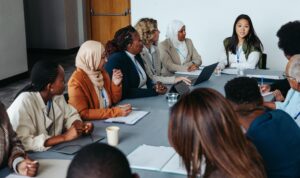Get Paid for Legal Community Surveys
Want to get paid for your opinion? Legal community surveys let you share honest feedback about real legal scenarios. Find out how they work and how to join Nelson Recruiting’s participant panel.
Legal Community Surveys, Participant
2 min read
You might be shocked to hear that there is a practical use for the instinct if you have ever seen a courtroom drama and thought, “I would have ruled that differently.” Regular people can provide their opinions on actual cases and receive compensation for their time by participating in legal opinion polls. It can be an interesting event, but it’s also quite important for lawyers’ trial preparation.
We at Nelson Recruiting link participants to paid legal research opportunities, such as opinion panels, community attitude surveys, and simulated juries. Here’s what to anticipate if this kind of study is new to you.
What Is a Community Attitude Survey?
Trial consultants and law firms utilize a sort of legal research called a community attitude survey to determine how people who are eligible for a jury react to particular facts, legal arguments, or witness testimony. These polls are an effective way to determine whether a case is popular with the public, detect potential juror bias, and shape trial strategy.
Lawyers might use the comments to improve the way they make their argument in court. It may indicate if a witness is regarded as reliable or whether legal terminology is easily understood. In certain cases, it even affects choices about settlement talks or venue strategy.
The key is that you don’t need any legal experience to take part. People of all ages, backgrounds, and life experiences are welcome to speak to legal professionals.
Why Your Opinion Matters in Trial Preparation
Lawyers want to know how the typical juror could respond while they are preparing for trial. Here’s where your viewpoint is useful. You can assist lawyers in forecasting the outcome of their case in court by providing truthful answers to questions in a legal survey.
You may be asked if you believe a witness to be credible or if a certain argument makes sense. You may occasionally watch a video and answer questions regarding the presentation. Trial teams gain a better understanding of emotional responses, message clarity, and persuasive impact from these responses.
Its goal is to provide legal teams with the knowledge they need to successfully prepare for trial, not to sway a particular case.
What to Expect When You Participate
Although the format of legal surveys varies, joining the Nelson Recruiting panel entails the following:
- You are welcome to take part. When an opportunity fits your profile, we’ll give you a call or send you an email.
- You finish a quick pre-screening. To make sure the study is a good fit, you could be asked a few questions.
- You complete the survey. While some are done in person or via video call, others are done online. We will inform you of what to anticipate.
- You are compensated for your time.. The length and manner of the compensation vary, but we always make sure it’s worth your time.
The average length of a legal survey is 10 to 90 minutes. Longer mock jury sessions typically pay more and can last for several hours.
What Types of Questions Will You Answer?
Depending on the situation, several questions may be asked, but the following are some examples of possible questions:
- Which side made their argument more convincingly?
- Was there any testimony that struck you as particularly compelling—or dubious?
- What is your level of confidence in your opinion, and why?
- Would you give the plaintiff damages?
Additionally, you may be asked to score the emotional impact of particular arguments, the clarity of a case summary, or how seeing evidence affected your perspective. All criticism is legitimate, regardless of whether it stems from reason, feeling, or intuition.
Who Can Participate?
Almost everyone can. We are seeking participants that are honest, considerate, and prepared to honor the process. We seek to include individuals from a wide range of backgrounds, occupations, and ages because trial teams want input that represents the whole public.
There may be particular requirements for some research, such as avoiding conflicts of interest in cases involving your industry. If there are any limitations, we will always notify you in advance.
Legal Surveys vs. Mock Juries
Mock juries, as you may have heard, involve people reviewing a case in its entirety and deliberating as though they were actual jurors. In contrast, legal surveys are typically shorter and concentrate more on individual responses than group discussions.
Both kinds of research aid lawyers in honing their strategy. At each level of preparation, trial teams will select the format according to the type of information they require.
Why People Love Participating
Not only do people like this research because they are paid, but they also find the experience to be truly interesting. You receive a unique, behind-the-scenes glimpse into how lawyers prepare for court and consider their cases.
Better yet, you can express your candid viewpoint in an environment that respects it without having to sit on a jury.
Join Our Legal Research Database
Nelson Recruiting can put you in touch with worthwhile legal research possibilities if you’re prepared to contribute your ideas and get compensated for it. Participants from a variety of backgrounds contribute significantly to trial teams’ preparation for the courtroom.
Signing up just takes a few minutes. When a position fits your experience, we’ll get in touch with you, and you’ll be involved in developing the trial strategy from the ground up.
Related Articles
Tips for a Smooth Focus Group Experience: From Tech Checks to Timing
Maximize your focus group experience. Discover practical tips on tech checks, timing, and preparation to ensure a smooth and stress-free session.
What to Expect in Your First Focus Group: A Step-by-Step Guide
New to focus groups? Learn what to expect in your first session with this step-by-step guide from Nelson Recruiting.
Why Your Voice Matters: How Focus Group Participants Shape Brands and Products
Focus group participants play a vital role in shaping products and brands. Learn how your opinions influence decision-making and why your voice matters.



